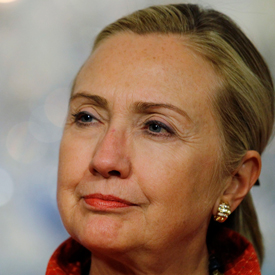US gathers its allies to put pressure on Iran
The US and Saudi Arabia are to take Iran to the UN Security Council for its alleged role in a plot to kill the Saudi ambassador, as Washington Correspondent Matt Frei reports.
US Secretary of State Hillary Clinton has said that Iran‘s alleged ties to a plot to kill the Saudi ambassador in Washington mark a “dangerous escalation” of Tehran’s sponsorship of terrorism.
Officials added that it was “more than likely” that Iran’s supreme leader and the head of its Quds force was involved. However a Middle east expert from Chatham House has told Channel 4 News this is “highly doubtful”.
Read more: Questions over Iran's role in assassination plot
It follows the arrest of two men with links to Iranian security agencies in connection with alleged plans to target Adel al-Jubeir.
FBI Director Robert Mueller told a news conference that it was a convoluted plot, involving monitored international calls, Mexican drug money and an attempt to assassinate Adel al-Jubeir in a Washington restaurant.

Iran has denied the charge and called the allegations “shameful”. In a letter to UN Secretary General Ban Ki-Moon, Iran’s ambassador to the United Nations accused the United States of “warmongering”.
“The US allegation is, obviously, a politically motivated move and a showcase of its long-standing animosity towards the Iranian nation,” said Mohammad Khazaee, before restating that Tehran “categorically and in the strongest terms condemns this shameful allegation.”
The US is working with Saudi Arabia to take the matter up with the United Nations Security Council.
US Vice President Joe Biden said that Iran would be held accountable for the “outrageous” act and that the Obama administration is working to unite world opinion behind a US response.
Iran categorically and in the strongest terms condemns this shameful allegation. Mohammad Khazaee
The prime minister’s office said that the UK supported US measures to hold Iran accountable for its actions and that it is keeping closely in touch with the US. “Indications that this plot was directed by elements of the Iranian regime are shocking,” said a spokesman. “Directing an attack against another country…calls for the strongest condemnation.”
On Tuesday night, the US government also released a worldwide travel alert for US citizens, saying the Iranian-backed plot might indicate: “a more aggressive focus by the Iranian government on terrorist activity against diplomats from certain countries, to include possible attacks in the United States.”
Two men arrested, five under sanctions
The US Attorney General Eric Holder alleged that the Islamic Revolutionary Guard Corps (IRGC) and the Quds force, its secret, operational arm, were behind the plot to kill. “I think one has to be concerned about the chilling nature of what the Iranian government attempted to do here,” he said.

Pictured above: The Saudi embassy in Washington DC. (Getty)
The two alleged plotters have been named as Gholam Shakuri, a member of the Quds force, and Manssor Arbabsiar, 56, who is a US citizen and holds an Iranian passport. The other three men are thought to be senior Quds members.
Mr Shakuri is alleged to have approved a $100,000 payment to Mr Arbabsiar as a deposit for the attempted assassination.
I think one has to be concerned about the chilling nature of what the Iranian government attempted to do here. US Attorney General Eric Holder
The IRGC allegedly asked Mr Arbabsiar to hire Mexican gangsters to kill the Saudi ambassador, with an anticipated total payment of $1.5m.
In May, he made contact with a member of the US Drug Enforcement Agency, posing as a member of a Mexican drug cartel.
Mr Arbabsiar was arrested at the John F Kennedy International Airport in New York on 29 September as he arrived from Mexico and initially cooperated with authorities.
The two men have been charged with conspiracy to murder a foreign official, conspiracy to use a weapon of mass destruction and conspiracy to commit an act of international terrorism, said Mr Holder.
Iran and Saudi relations
Iran and Saudi Arabia are regional rivals and there has been long running tension, in relation to both religious and political differences. The countries are proponents of different interpretations of Islam: Saudi Arabia has a deep mistrust of the Shia clerics of Iran, while Iran rejects the Wahhabi Saudi Arabia, and they have taken opposing sides in nearby wars for decades.
Tense relations between Iran and Saudi Arabia were cast into the spotlight in November last year after the emergence of a WikiLeaks cable detailing diplomatic discussions.
WikiLeaks revealed that King of Abdullah of Saudi Arabia repeatedly urged US to attack Iran and destroy its nuclear programme saying they should “cut off the head of the snake” while there is still time. US officials compared Iranian president Mahmoud Ahmadinejad to Adolf Hitler.
Another cable stated that the Saudi King was recorded as having “frequently exhorted the US to attack Iran to put an end to its nuclear weapons programme”.
Read more: Questions raised over Iran’s role in Saudi ambassador’s assassination plot
